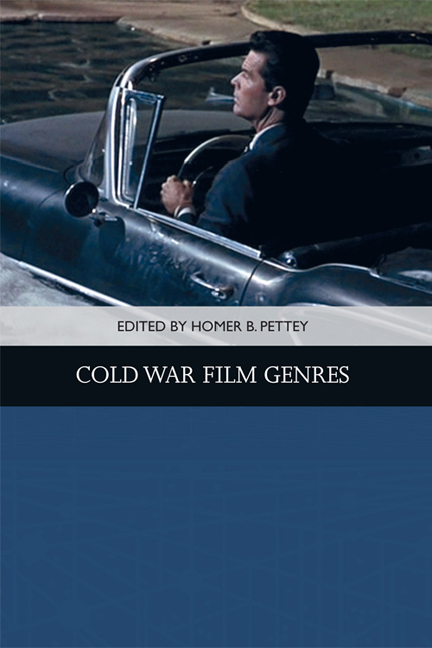Book contents
- Frontmatter
- Contents
- List of Illustrations
- Acknowledgments
- Notes on the Contributors
- 1 Introduction: Cold War Genres and the Rock-and-Roll Film
- 2 Social Factors in Brainwashing Films of the 1950s and 1960s
- 3 The Berlin Crisis? Piffl!: Billy Wilder’s Cold War Comedy, One, Two, Three
- 4 The Small Adult Film: A Prestige Form of Cold War Cinema
- 5 “I’m Lucky – I Had Rich Parents”: Disability and Class in the Postwar Biopic Genre
- 6 Rogue Nation, 1954: History, Class Consciousness, and the “Rogue Cop” Film
- 7 Internal Enmity: Hollywood’s Fragile Home Stories in the 1950s and 1960s
- 8 Suburban Sublime
- 9 Domestic Containment for Whom? Gendered and Racial Variations on Cold War Modernity in the Apartment Plot
- 10 Success and the Single Girl: Urban Romances of Working Women
- 11 Paris Loves Lovers and Americans Loved Paris: Gender, Class, and Modernity in the Postwar Hollywood Musical
- 12 Straight to Baby: Scoring Female Jazz Agency and New Masculinity in Henry Mancini’s Peter Gunn
- Index
1 - Introduction: Cold War Genres and the Rock-and-Roll Film
Published online by Cambridge University Press: 24 April 2021
- Frontmatter
- Contents
- List of Illustrations
- Acknowledgments
- Notes on the Contributors
- 1 Introduction: Cold War Genres and the Rock-and-Roll Film
- 2 Social Factors in Brainwashing Films of the 1950s and 1960s
- 3 The Berlin Crisis? Piffl!: Billy Wilder’s Cold War Comedy, One, Two, Three
- 4 The Small Adult Film: A Prestige Form of Cold War Cinema
- 5 “I’m Lucky – I Had Rich Parents”: Disability and Class in the Postwar Biopic Genre
- 6 Rogue Nation, 1954: History, Class Consciousness, and the “Rogue Cop” Film
- 7 Internal Enmity: Hollywood’s Fragile Home Stories in the 1950s and 1960s
- 8 Suburban Sublime
- 9 Domestic Containment for Whom? Gendered and Racial Variations on Cold War Modernity in the Apartment Plot
- 10 Success and the Single Girl: Urban Romances of Working Women
- 11 Paris Loves Lovers and Americans Loved Paris: Gender, Class, and Modernity in the Postwar Hollywood Musical
- 12 Straight to Baby: Scoring Female Jazz Agency and New Masculinity in Henry Mancini’s Peter Gunn
- Index
Summary
From the end of World War II in 1945 to the fall of the Berlin Wall in 1989, the Cold War period ushered in new film genres that reflected and deflected political and social anxieties of the period. In general, cinema scholars view Cold War-era cinema as tending toward two essential aims: to be reliable expressions of American freedom in the face of Communist oppression; to reinforce individualism against collectivism as a distinctly American trait. Traditionally in cinema studies, Cold War films fall into two main categories, American “propaganda” to comply with the House Un-American Committee's (HUAC) anti-Communist agenda or as “allegories that offer disguised comment on American politics.” Film critics have interpreted 1950s sci-fi films and Westerns as fulfilling these cultural mandates, if not serving as warnings of complacency and complicity in the face of an ominous Communist, atomic threat. Communist-themed films hardly constitute the majority of films that Hollywood produced during this very inventive, genre-expansive period. Many of these popular film genres have received little notice by film scholars, as though transformative and emerging generic film innovations did not represent the Cold War period. Such a viewpoint relegates several decades to somewhat doctrinaire views of a major period in American filmmaking. This collection of essays not only wishes to expand historical and critical viewpoints but also wishes to display numerous recognizable and diverse approaches to emerging film genres during this period.
For American cinema, the Cold War supplied ample conflict and anxieties about the new postwar period, particularly with the intrusion of the federal government. Several fine studies have made detailed cases from recently accessible archival materials. Tony Shaw's Hollywood's Cold War (2007) examines the “state–private networks” of two image-makers, Hollywood and Washington, D. C., that imposed upon filmmakers a propaganda machine to promote doctrinaire capitalism:
This led to a range of pressures being imposed on filmmakers which affected both the content and distribution of movies. It also entailed a whole range of official organisations – including the FBI, State Department, Pentagon, CIA, and USIA – constructively engaging with filmmakers in myriad ways. This proactive approach included openly lending logistical and financial assistance to trustworthy filmmakers, and secretly setting up consortia of famous directors, producers, and actors to sell American democracy.
- Type
- Chapter
- Information
- Cold War Film Genres , pp. 1 - 20Publisher: Edinburgh University PressPrint publication year: 2018



